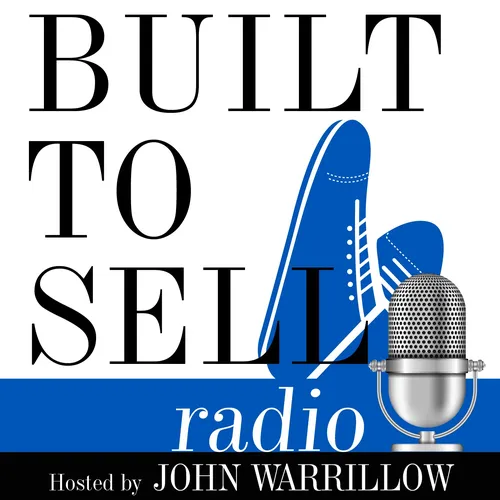
Built to Sell Radio
Built to Sell Radio is a weekly podcast for business owners interested in selling a business. Each week, we ask an entrepreneur who has recently sold a business why they decided to sell their business, what they did right and what mistakes they made through the process of exiting their business. Built to Sell Radio is the ultimate insider's guide to approaching the most important financial transaction of your life.
- Update frequency
- every 7 days
- Average duration
- 53 minutes
- Episodes
- 512
- Years Active
- 2015 - 2025

Ep. 71 An Interview with The E-Myth’s Michael Gerber
The first book I ever read about entrepreneurship was The E-Myth by Michael Gerber.
I loved it.
Gerber’s knack for simplifying the complex art of starting and growing a company resonated with me imme…

Ep. 70 Inside the Mind of a Private Equity Investor
Frank Cottle led an investor group to buy Hi-Mark Software for 10 times EBITDA. Cottle then sold a chunk for 15 times and ultimately sold his last tranche of equity for more than 16 times EBITDA to L…

Ep. 69 A Cautionary Tale
Most of our Built to Sell Radio episodes have been success stories but this week’s show is a cautionary tale of what happens when you don’t plan ahead. It features Dan Bradbury, a young entrepreneur …

Ep. 68 How to structure your earn-out
Mark Stephenson and his partners grew their conference business, Media Edge Communications, to north of $10 million in annual revenue when they were approached by an acquirer. They agreed to a deal t…

Ep. 67 The 8:1 Flip
Steve Huey bought The Learning House, a company that creates online courses on behalf of colleges, for $2.7MM in 2007 because he saw the opportunity to professionalize the sales and account managemen…

Ep. 66 Are you stacking a few Benjamins?
Joe Saul Sehy is the host of Stacking Benjamins, a popular personal finance podcast on which he has interviewed everyone from Jean Chatzky to David Bach.
Sehy’s journey to becoming a podcasting sensa…

Ep. 65 The downside of accepting shares as payment from your acquirer
Doug Chapiewsky built CenterPoint Solutions Inc. into an Inc. 500 company with $5 million in revenue and more than $3 million in EBITDA before he sold it to Israeli-based Nice Systems. In this episod…

Ep. 64 Two to Tango
Manny Fernandez started HomeBuyingCenter.com in 2007, just as the real estate market started to wobble in the United States. As it turned out, his timing was perfect as his site helped underwater hom…

Ep. 63 What Do You Need From The Sale Of Your Business?
Of course you want an all-cash offer at a beefy multiple with no strings attached, but what do you really need from the sale of your company?
That’s a question Dr. Frank Gibson thought a lot about. H…

Ep. 62 How One Pivot Doubled The Value of This Business
James Garvey and his partner grew Objective Loyalty from a standing start in 2005 to $2.5 million in EBITDA before they decided to sell their email marketing platform.
Garvey’s investment banker spen…

Ep. 61 How To Structure Your Earn-Out
An earn out is a way to bridge the gap between what you want for your business and what a buyer is willing to pay. In an earn out, a portion of the sale price of your business is set aside for paymen…

Ep. 60 When To Sell Your Business
Peach New Media was launched in 2001 by Dave Will, who carried the title “Chief Peach” until he sold the business in 2015. Will had built his learning-management software company up to 40 employees w…

Ep. 59 Think Twice Before Starting That New Division
Jim Beach sold American Computer Experience for $200 million, which sounds like a fantastic exit, but when I asked Beach if he had any regrets I was surprised by how long a list of lessons he had to …

Ep. 58 The Surprising Truth About Who Will Buy Your Company
In 1999, Andrew Weinreich sold Six Degrees, a social networking site based on the same idea that sparked the likes of LinkedIn and Facebook, for $125 million. In the following years, he went on to se…

Ep. 57 How To Quadruple The Value Of Your Business
Intellectually, you know you need recurring revenue, but how do you build an annuity stream in an industry where subscription billing is not the standard?
Take a look at the example of Laura Steward,…

Ep. 56 The $20 Million Mistake
Rod Drury is the founder and CEO of Xero, a cloud-based accounting platform that competes head on with Intuit’s QuickBooks.
Started in 2006, Xero now boasts 700,000 subscribers and a market capitaliz…

Ep. 55 Lessons From A £20 Million Exit
Have you ever stayed in a fancy hotel and wondered how much they pay Aveda for those little bottles of shampoo? Turns out, there is a company called Pacific Direct that acts as a middleman between th…

Ep. 54 The Competitive Threat
A direct competitor can often be the most likely buyer for your business. A competitor already knows your industry and may see your company as a way to consolidate market share and gain more pricing …

Ep. 53 Who Would Buy Your Business?
Part of building to sell is knowing who you are going to sell to.
If you don’t start thinking about your potential buyers list early, you may end up growing an entire appendage of your business that…

Ep. 52 Selling The Baby In The Bathwater
If you run a service, my guess is you’ve dreamt of owning a product business instead.
Service businesses are such a mess – demanding clients, scope creep, and more often than not, slow growth.
Which …